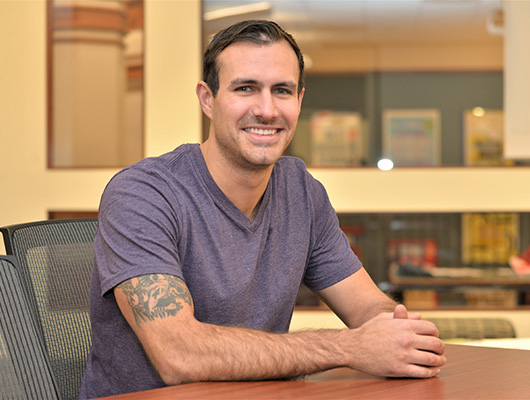Hussain Morawala, an international student from Dubai, was considering taking a year off after receiving his bachelor’s degree from DePaul University’s Driehaus College of Business before returning home to work in the family business. Instead, much to his parent’s delight, he decided to continue his education at DePaul and signed up for the combined degree program to receive his master’s degree in supply chain management with only an additional year of schooling.
 Hussain Morawala
Hussain Morawala
“Receiving both degrees at the same time makes sense time wise and financially,” says Morawala who is entering his second quarter in the master’s program at the Kellstadt Graduate School of Business at DePaul. “I was able to take graduate-level courses as an undergrad and now I get the Double Demon scholarship (for DePaul alumni) and can finish the program in a year.”
Morawala’s family owns a supply chain company in Dubai that provides equipment to construction companies. Once he earns both degrees, he would like to first get a job in the United States to gain supply chain experience before returning home and eventually joining the family business.
“Combined degrees are also beneficial for people who would like to get another year of analytical knowledge before entering their career,” says Morawala. “There is a high demand for supply chain jobs and a small amount of students with master’s degrees. Students who get involved in the combined degree will have an easier time getting a job in the up-and-coming industry.”
Students Save Time and Tuition Dollars with Combined Degrees
DePaul’s combined degree program allows students to begin taking up to three graduate courses in their senior year at the undergraduate tuition level. By the time students graduate from their undergraduate program, they have already begun taking their master’s level courses. Once they begin their master’s program, the Double Demon scholarship kicks in, which takes 25 percent off graduate tuition for alumni. This can mean an overall savings of 40 percent or more for a master’s degree.
“When a student expresses interest in the combined degree program, I like to meet with them and discuss why they are interested,” says Anthony Cuellar, assistant director of recruiting for the Kellstadt Graduate School of Business. “Aside from the financial and time benefits, these students are preparing for their future career. They may not know what they want to do in their careers—which is okay—as long as they have an interest in pursuing a career path in the program they select.”
Cuellar recommends that undergraduate students interested in a combined degree program speak with him or another DePaul advisor to discuss their interests and how to schedule graduate courses in their senior year. He also answers questions about joining the workforce once a student has both their bachelor’s and master’s degrees.
“Because students are going into the graduate program without any professional on-the-job experience, many are concerned about entering the workforce after completion of the program,” says Cuellar. “However, while the student may apply for lower level positions once they have their combined degree, they are more likely to get promoted several times in the first few years. These students are getting advanced-level learning sooner, which sets them up well for career success.”
Combined Degrees Boost Career Options
Daniel Merryweather is also in the combined degree program for supply chain management. An army veteran, Merryweather decided to finish his undergraduate degree at DePaul last year after completing some courses at another college and enlisting and serving in the army. While finishing up his undergraduate program at an accelerated pace, Merryweather decided to pursue a master’s degree at the same time.
 Daniel Merryweather
Daniel Merryweather“I wanted to graduate with both my master’s and bachelor’s degrees to help boost my career options,” says Merryweather. “A master’s degree is almost necessary when you are competing for upper-level positions.”
In addition to taking a full load of courses every quarter including the summer, Merryweather works part-time in operations at Amazon Logistics and would one day like to manage his own distribution center. When he spoke with his professors and advisors and discovered he could save money and time by enrolling in the combined degree program, he immediately signed up.
“Being able to show that you can complete graduate work and do well in the program will help me reach my career goals,” he says. “Besides saving you money and time, getting a master’s degree demonstrates how serious you are about your career progression.”
The Master of Science in Supply Chain Management is designed for early career professionals, like Morawala and Merryweather, who want to gain the leadership and technical skills necessary to manage supply chains. The program provides students with a broad-based knowledge of sourcing, procurement, transportation, warehousing, production and distribution.
“A student interested in supply chain management has three options to deepen their knowledge on this topic,” says
Nezih Altay, associate professor in the Department of Management &Entrepreneurship. “They can do internships, they can start working in supply chain management immediately after school or they can get the combined degree. It is unlikely for a student to learn as much from their job in one year as they can from the combined degree.”
Altay says that with on-the-job training, the student may or may not learn as much depending on their job and the company or sector they work in. He also notes that the first few months will consist of the student getting adjusted to work life and learning the internal processes of the company they work with.
“When we were creating the curriculum for MS in Supply Chain Management we consulted with supply chain executives and made sure that the curriculum prepares students for jobs in supply chain,” continues Altay. “The advantage of a combined degree is accelerated learning and readiness for the workforce.”
Learn more about the Driehaus College of Business's Combined Degree Programs.
For more information on applying for any combined degree programs at DePaul’s business school, contact the Anthony Cuellar in the Kellstadt Graduate School of Business at
acuella2@depaul.edu or at 312-362-5705.